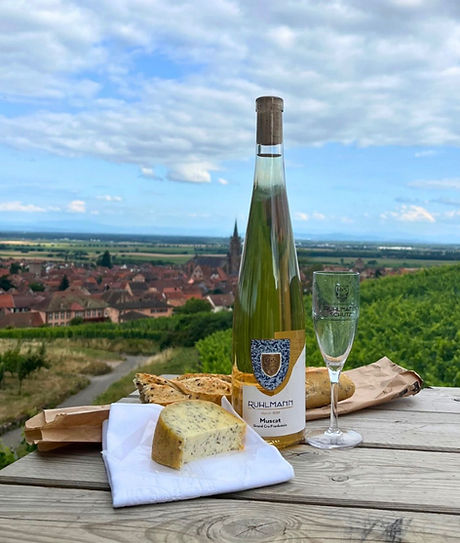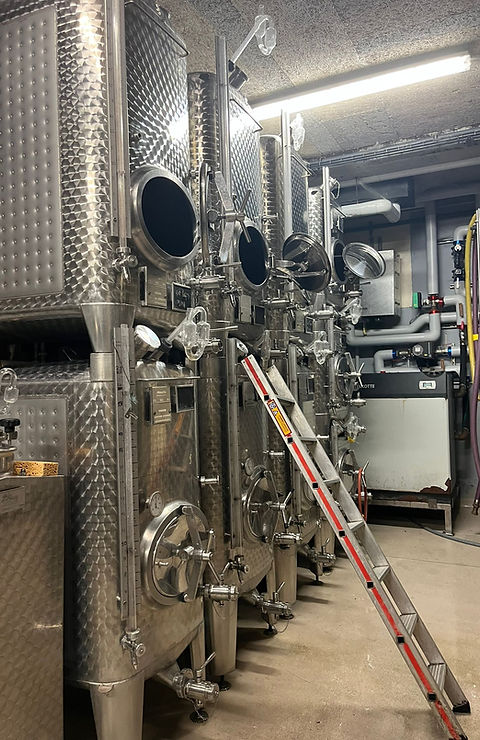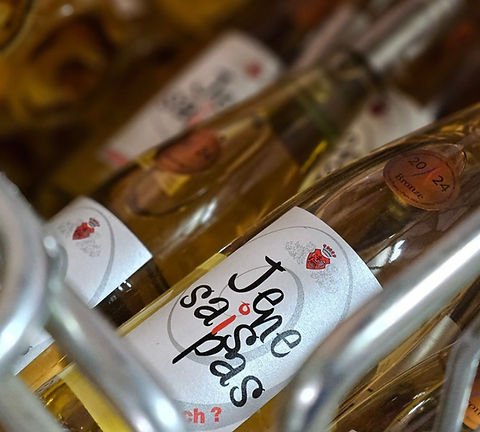Florian & Matilda Beck-Hartweg
At Florian&Matilda Beck-Hartweg, elegance is at the heart of every bottle. For seventeen generations, Florian and Matilda have continued their family’s legacy of crafting expressive, refined wines from their seven acres of land in Alsace.
Each bottle is a reflection of nature’s diversity. They work with almost every grape variety they grow, creating harmonious blends that reveal beautiful layers of aroma and flavor. Their philosophy extends beyond the cellar: blending begins already in the vineyard, where different grape varieties are planted together to express the terroir as one living ecosystem.
The vineyard rests on seven distinct types of soil, including the rare volcanic soil that gives unique depth and minerality to certain wines. The Bungental 2023, sourced from this volcanic terroir, unfolds with round, elegant aromas and remarkable expression, a true embodiment of the Beck-Hartweg style.
As Florian says:
“When you look at an object, you only see one side. But if you look underneath, behind, and around it, you begin to see the whole. It’s the same with wine.”
Every Beck-Hartweg wine invites you to look deeper, to discover its elegance, its story, and the many sides of its soul.


Their approach to winemaking is both traditional and thoughtful. Large, old oak barrels are used to round and refine the wines. Young wines spend a short time aging before bottling, while older cuvées mature for up to a year. A few select wines rest in stainless steel tanks, preserving their pure, vibrant character.
For most of their white wines, Florian and Matilda keep the grape skins and pips during fermentation to add an extra touch of texture and flavor. Not enough to call it an orange wine, but just enough to give it something intriguing, an extra whisper of depth and identity. From the lightest cuvée to the richest white, a delicate salty note runs through every bottle, a gift from their unique soils.

As Florian says:
“When you look at an object, you only see one side. But if you look underneath, behind, and around it, you begin to see the whole. It’s the same with wine.”

Ruhlman Schutz
Nestled in the medieval village of Dambach‑la‑Ville since 1688, the Ruhlmann-Schutz family vineyard draws on centuries of tradition, marrying time-honoured craftsmanship with modern winemaking.
Spanning approximately 45 hectares in Alsace, the estate cultivates its vines across a diverse range of soils. From granite to sandstone and marl, benefiting from the unique micro-climate sheltered by the Vosges mountains.
While the core of the vineyard is dedicated to their classic Alsace wines, the company also channels its most exceptional wines into the export market, ensuring that these special selections carry the full expression of terroir and craftsmanship to discerning wine lovers abroad.


In pursuit of richer conditions for red-grape varieties, Ruhlmann-Schutz expanded with a second vineyard in the south of France, the estate of Château Valmont in the Corbières region near Peyriac-de-Mer. This southern site complements their Alsace holdings, enabling them to cultivate grape varieties best suited to warmer, red-wine-friendly terroirs.
On top of their fine varietals, the estate is committed to innovation and experimentation. A prime example is their “Délicat S” – a creative expression of red-skinned Sylvaner that surprises with its salmon hue, dark fruit notes and refreshing minerality.
Together, these two vineyards - the historic Alsace estate and the southern French red-grape site - allow Ruhlmann-Schutz to present a rich palette of wines: rooted in tradition, yet forward-looking, diverse, and expressive.
Chateau Bellet
Perched high above the city of Nice, Château de Bellet captures the spirit of the Mediterranean in every bottle. Between sea and sky, this historic estate stands as one of France’s most singular vineyards, where vines have flourished since the 18th century under the care of the noble Bellet family. Today, the château continues that lineage, a dialogue between heritage, authenticity, and the untamed beauty of nature.
The vineyard’s soul lies beneath the surface. The vines grow on terraced slopes carved into the distinctive “poudingue” soil. A compact blend of rounded pebbles from the ancient Var river, limestone sands, and pockets of clay. This rare geological formation ensures perfect drainage and imbues the wines with a remarkable minerality. At 200 to 300 meters above sea level, cooled by both sea breezes and alpine winds, the grapes ripen slowly, preserving freshness and finesse while reflecting the sunlight of the Côte d’Azur.



Faithful to its roots, Château de Bellet cultivates only the region’s native varieties: Rolle (Vermentino) for the whites, Braquet and Folle Noire for the reds and rosés. These grapes, once nearly forgotten, now define the estate’s distinctive style. Certified organic since 2013, the vineyard is tended with care and restraint. Minimal intervention, deep respect for the land, and a belief that true expression begins in the soil.
In the cellar, the same philosophy continues. Each parcel is vinified separately, allowing the identity of each grape and slope to reveal itself. The whites, often pure Rolle, unfold with notes of pear, white flowers, and sun-warmed citrus, carried by a fine saline edge. The rosés are airy and delicate, with hints of rose petals and red berries, while the reds, often from Folle Noire, offer depth, freshness, and a subtle whisper of spice from the poudingue below.
Every bottle tells the story of this singular landscape, where sea and mountain meet, where wind and light shape every cluster, and where elegance is not created, but inherited.
Domaine Kientzler
At Domaine Kientzler elegance and purity come together in every wine. Situated in the hills around Ribeauvillé in Alsace, the estate is currently led with shared passion by brothers Thierry and Éric Kientzler, who took over from their father and carry forward a legacy handed down through generations. The vines stretch over slopes that climb three iconic Grand Cru hills, Geisberg, Kirchberg and Osterberg. Where the interplay of altitude, exposure and ancient soils creates a dramatic and deeply expressive landscape. From the estate’s viewpoint the panorama unfolds like a painting: vineyards, forest edges, the Vosges beyond, an ever-changing tableau that reminds you how deeply rooted this place is in nature.
Kientzler’s guiding philosophy is one of restraint and transparency: the wines are vinified exclusively in stainless steel tanks, so that nothing obscures the true character of the grape and the land. By relying on steel rather than oak, the estate ensures that the clarity of fruit, the minerality of the soil and the subtle climatic influences come through purely and brightly. Meanwhile, the three steep Grand Cru slopes lend structure, tension and a sense of place to each bottle. Geisberg with its terraced stone walls and ancient marl, Kirchberg with its cooler elevation and forest breezes, and Osterberg with its east-facing refinement.
This is a domain where tradition and precision meet. The brothers maintain the family’s dedication to dry, gastronomic wines, tending the vines with respect and working to reflect the landscape rather than overlay it. In every glass you sense the hillside sun, the limestone-marls beneath, the wind that sweeps down from the hills and the clear, steel-born expression of grape and site. Domaine Kientzler invites you to taste a place rendered with elegance, honesty and depth.


Fahrer & Fils
At Domaine Sylvie Fahrer et Fils, authenticity, tradition, and a deep sense of place come together in every wine. Nestled in the charming village of Saint-Hippolyte, on the Alsace Wine Route, the estate has been passed down through four generations of passionate vignerons. Today, Sylvie Fahrer and her son Sébastien continue to write the family story, combining inherited savoir-faire with a modern, thoughtful approach to the land.
The domaine lies at the foot of the Vosges Mountains, on a unique geological fault line that divides seven distinct soil types, from granite and clay to limestone and volcanic sands. This rare mosaic of terroirs gives the wines remarkable depth and individuality. Each parcel is tended with meticulous care, respecting the rhythms of nature and the integrity of the vine. Since 2021, the estate has been organically certified, a natural evolution of its long-standing respect for the environment.

Here, winemaking is guided by precision and restraint. The aim is not to impose a style, but to reveal what the vineyard has to say. Fermentation takes place mainly in stainless steel to preserve freshness, while select cuvées mature in traditional Alsatian foudres. Large old oak casks that lend texture without overwhelming the fruit. The result is a collection of wines that are both expressive and elegant, balancing purity with personality. From crisp, mineral-driven Rieslings to fragrant Gewurztraminers, delicate rosés, and refined Pinot Noirs, each bottle reflects the harmony between grape, soil, and family tradition. The wines of Domaine Fahrer et Fils speak softly but clearly of sunlight on the slopes, of cool Vosges breezes, and of the quiet confidence of a domaine rooted deeply in its land. To taste these wines is to discover the essence of Alsace itself: its diversity, its energy, and its timeless beauty. Distilled into every glass with care, patience, and devotion.

